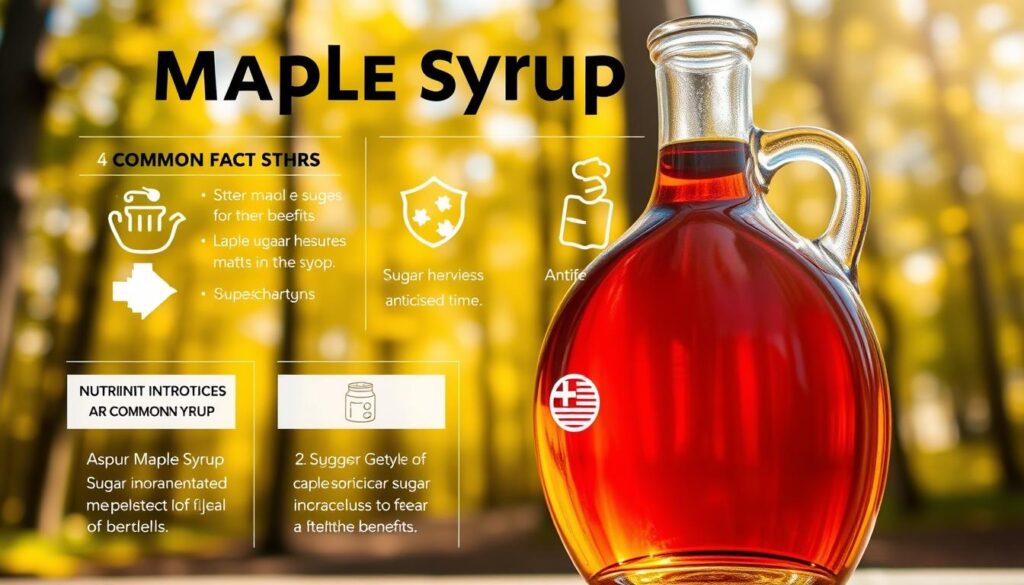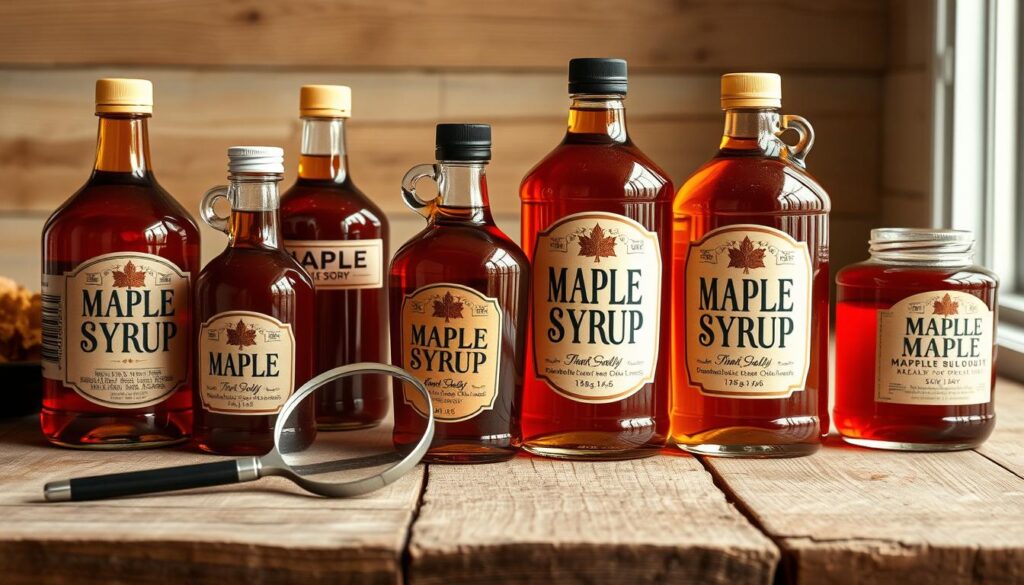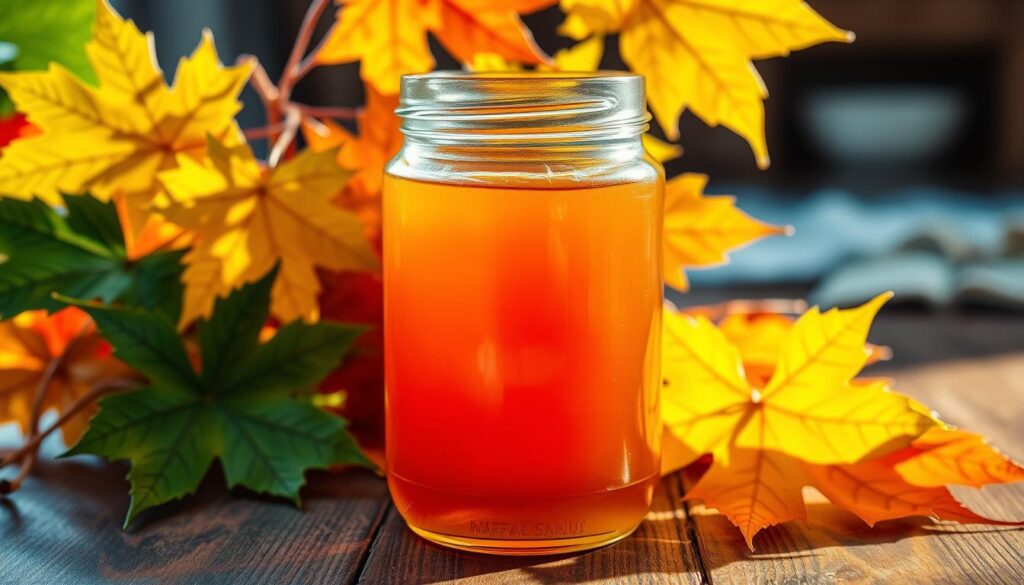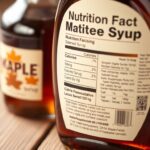Explore the amazing world of maple syrup, a natural sweetener full of health perks. It’s more than just a topping for pancakes. It’s a nutrient-rich choice that can change how you eat healthy.
Maple syrup’s benefits go beyond its tasty flavor. It comes from the sap of maple trees in the northeastern U.S. This sweetener is rich in minerals, antioxidants, and nutrients that boost your health.
Native American tribes first found maple syrup’s great value. They developed ways to collect it that today’s sugarmakers follow. They knew maple syrup was more than just sweet – it was good for you too.
Unlike fake sweeteners, maple syrup is good for you because of its complex makeup. Each tablespoon has minerals like zinc and manganese. These help your immune system and metabolism.
Studies show maple syrup is more than a simple flavor enhancer. Its natural makeup gives it benefits that artificial sweeteners can’t. It’s a great choice for those looking for healthy sweet options.
This guide will show you how maple syrup can improve your diet and health. It’s packed with nutrients and may even protect you. Maple syrup is where food tradition meets science.
Understanding Pure Maple Syrup: Nature’s Sweet Gift
Pure maple syrup is a natural treasure made over generations. It comes from the tall maple trees of North America. It has amazing benefits that artificial sweeteners don’t have.
The making of maple syrup starts in the forest. Skilled sugarmakers pick and care for maple trees. They turn tree sap into a tasty natural sweetener.
Traditional Harvesting Methods
Maple syrup making uses old methods that haven’t changed much. Sugarmakers tap maple trees in late winter and early spring. They choose trees that are big and healthy.
- Identify mature maple trees with optimal diameter
- Drill small holes in tree bark during dormant season
- Insert specialized taps to collect raw sap
- Collect sap using buckets or modern tubing systems
Processing and Grading Systems
After collecting, the sap is changed into syrup. Boiling and evaporation make the syrup thicker. This creates different syrup grades based on color and taste.
Differences from Artificial Sweeteners
Pure maple syrup is different from artificial sweeteners. It has natural nutrients and complex tastes. Organic maple syrup has no artificial additives. It also has minerals and antioxidants that fake sweeteners lack.
The Nutritional Profile of Maple Syrup
Maple syrup is more than just sweet. It’s packed with nutrients that boost your health. Unlike refined sugars, maple syrup has a complex nutritional profile.
The main parts of maple syrup nutrition include:
- Natural sugars with trace minerals
- Unique blend of antioxidants
- Essential micronutrients
Maple syrup health facts show it’s quite nutritious. A tablespoon has about 52 calories and lots of important minerals. It’s a better choice than artificial sweeteners for natural food lovers.
Nutritional breakdown highlights include:
| Nutrient | Amount per Tablespoon |
|---|---|
| Manganese | 33% Daily Value |
| Zinc | 6% Daily Value |
| Calcium | 2% Daily Value |
Maple syrup nutrition isn’t about being low-calorie. It’s about quality nutrients and natural sweetness. Enjoy it in moderation for more health benefits than processed sugars.
Sugarmakers make maple syrup with care. They ensure each drop keeps its natural nutrients and flavor. The minimal processing keeps the syrup’s rich mineral content and unique taste.
Essential Minerals and Vitamins in Maple Syrup
Maple syrup is more than just a sweetener. It’s packed with nutrients that boost health. These minerals and vitamins support overall wellness, making maple syrup a nutritional powerhouse.
Zinc and Manganese: Powerful Mineral Duo
Natural maple syrup is rich in minerals. Zinc and manganese are key, supporting metabolism and immune health. These trace minerals are vital for our well-being.
- Zinc supports immune system function
- Manganese helps with bone formation
- Both minerals are found in significant quantities in pure maple syrup
Calcium and Potassium: Electrolyte Essentials
Maple syrup also offers calcium and potassium. These electrolytes are key for bone health and muscle function. They help keep our cells balanced.
| Mineral | Benefits |
|---|---|
| Calcium | Supports bone strength and density |
| Potassium | Regulates heart and muscle function |
Riboflavin and B Vitamins: Energy Boosters
Maple syrup has riboflavin and B vitamins. These nutrients are vital for energy. They help turn food into energy, boosting vitality and wellness.
- Riboflavin supports cellular growth
- B vitamins enhance metabolic processes
- Natural energy support without artificial additives
Antioxidant Properties of Maple Syrup
Pure maple syrup is more than just sweet. It’s packed with antioxidants that make it a nutritional superstar. Unlike refined sugars, maple syrup has special compounds that shield our cells from harm.
The benefits of pure maple syrup go beyond its sweetness. Scientists have found many phenolic compounds in it. These compounds fight off oxidative stress in our bodies.
- Contains over 24 different antioxidant compounds
- Provides more antioxidants than many other natural sweeteners
- Rich in polyphenols that support cellular health
Studies show darker maple syrup has more antioxidants. These compounds help fight inflammation and may lower the risk of chronic diseases.
“Maple syrup is not just a sweetener, but a natural medicine cabinet in a bottle.” – Nutrition Research Team
Maple syrup has unique compounds like quebecol. This antioxidant is only found in maple syrup. It forms during production and protects our cells in amazing ways.
Maple Syrup Benefits for Your Overall Health
Maple syrup is more than a tasty sweetener. It offers many health benefits, making it great for a balanced diet.
Its nutritional profile supports many health aspects. Unlike refined sugars, maple syrup gives more than just calories.
Boosting Immune System Function
Pure maple syrup has minerals and compounds that boost the immune system. Zinc and manganese help make immune cells and fight off infections.
- Supports white blood cell development
- Provides antioxidant protection
- Helps combat seasonal infections
Supporting Digestive Health
Maple syrup might have prebiotic properties. These could help keep the gut microbiome balanced. This supports healthy digestion and good bacteria growth.
| Digestive Health Benefit | Potential Impact |
|---|---|
| Prebiotic Properties | Supports Beneficial Bacteria |
| Mineral Content | Aids Digestive Enzyme Function |
Fighting Inflammation Naturally
Maple syrup has anti-inflammatory compounds. Polyphenols in it might reduce chronic inflammation. This could help fight off inflammatory responses in the body.
Natural nutrition meets therapeutic benefits in every drop of pure maple syrup.
Comparing Maple Syrup to Other Natural Sweeteners
Finding the right natural sweetener can be tough. Organic maple syrup is a standout for its health benefits. It beats out honey, agave, and coconut sugar in many ways.
Let’s look at what makes maple syrup special:
- Honey: Maple syrup has fewer calories and more minerals
- Agave Nectar: It has a lower sugar spike and more antioxidants
- Coconut Sugar: Maple syrup gives you more zinc and manganese
Organic Maple Syrup Benefits are clear in its nutrient-rich profile. It’s packed with minerals that boost health. Unlike refined sugars, maple syrup is a complex, nutritious choice.
| Sweetener | Calories per Tbsp | Key Nutrients |
|---|---|---|
| Maple Syrup | 52 | Zinc, Manganese, Antioxidants |
| Honey | 64 | Enzymes, Trace Minerals |
| Agave Nectar | 60 | Limited Mineral Content |
Maple syrup’s nutritional profile shows it’s a top natural sweetener. Its mix of minerals, antioxidants, and low sugar impact makes it great for those who care about their health.
Blood Sugar Management and Glycemic Index
Maple syrup is interesting for managing blood sugar levels. It offers a unique approach to understanding how it affects our metabolism. This natural sweetener has a lot to teach us about blood glucose regulation.
Maple syrup is more than just sweet. It helps regulate blood sugar levels better than refined sugars. It contains compounds that may help control insulin levels.
Diabetic Considerations
People with diabetes need to be careful with maple syrup. It’s not a green light for eating as much as you want. But, using it wisely can have metabolic benefits:
- Lower glycemic index than white sugar
- Minerals that support metabolic health
- Potential insulin sensitivity improvements
Nutritionists suggest eating it in moderation. They also advise monitoring blood sugar levels closely when adding maple syrup to a diabetic diet.
Post-Workout Recovery Benefits
Athletes and fitness lovers might find maple syrup great for recovery. Its natural sugars help quickly refill muscle glycogen.
| Nutrient | Recovery Impact | Quantity per 100g |
|---|---|---|
| Carbohydrates | Muscle Glycogen Restoration | 68g |
| Manganese | Energy Metabolism | 0.9mg |
| Zinc | Muscle Repair | 0.04mg |
Adding maple syrup to post-workout meals can speed up recovery. It also gives important nutrients for better performance.
Incorporating Maple Syrup into a Healthy Diet
Maple syrup is a tasty way to boost your nutrition. It’s more than just a sweetener. It’s a natural choice for those avoiding refined sugars.
When adding maple syrup to your diet, it’s important to watch your portions. Experts suggest:
- Limiting daily intake to 1-2 tablespoons
- Using as a replacement for refined sugar
- Choosing pure, dark-grade maple syrup for maximum nutritional benefits
Smart strategies for incorporating maple syrup include:
- Drizzling over morning oatmeal
- Mixing into smoothies
- Using as a natural sweetener in baking
- Creating salad dressings
“Maple syrup isn’t just a condiment—it’s a nutrient-rich food that can support a balanced diet when consumed mindfully.” – Nutrition Experts
It’s important to know how maple syrup affects blood sugar. Even though it has nutrients, it can raise blood sugar levels. People with diabetes should talk to their doctors about how much to eat.
The secret to a good Maple Syrup Diet is moderation and smart use. This natural sweetener can become a valuable part of a healthy diet.
Culinary Applications and Cooking Tips
Maple syrup is more than just a pancake topping. It’s a versatile ingredient for sweet and savory dishes. Its rich flavor makes it perfect for many culinary creations, opening up new possibilities in home cooking.

Chefs and home cooks love maple syrup for its unique sweetness and depth. It’s great for adding flavor to all kinds of dishes. This makes cooking with maple syrup both fun and rewarding.
Baking with Maple Syrup
Maple syrup can change the game in baking. Here are some tips for using it:
- Reduce liquid ingredients by 1/4 cup for each cup of maple syrup used
- Lower oven temperature by 25 degrees to prevent over-browning
- Use dark maple syrup for deeper flavor in chocolate or spice-based baked goods
Savory Dish Applications
Maple syrup is not just for desserts. Innovative chefs use it in marinades, glazes, and dressings. This adds complex flavors to savory dishes.
- Brush maple syrup on roasted vegetables for caramelized edges
- Create maple-based barbecue sauces for grilled meats
- Whisk into salad dressings for a subtle sweet undertone
Learning about maple syrup’s versatility can make cooking more exciting. Home cooks can turn simple recipes into amazing meals.
Selecting and Storing Quality Maple Syrup
Choosing the right pure maple syrup is key to getting its health benefits. Not all maple syrups are the same. Knowing how to pick and store it can boost its nutritional value and taste.
When picking organic maple syrup, keep these points in mind:
- Look for 100% pure maple syrup with minimal processing
- Check for USDA organic certification
- Examine the color and grade of the syrup
- Verify the source and production method
Maple syrup grades tell you about its taste and quality. Here’s a quick guide:
| Grade | Color | Flavor Profile | Best Uses |
|---|---|---|---|
| Golden | Light | Delicate | Baking, desserts |
| Amber | Medium | Rich | Cooking, pancakes |
| Dark | Deep | Strong | Marinades, glazes |
Storing syrup right is key to keeping its benefits. Keep it in a cool, dark spot before you open it. Once opened, put it in the fridge to stop fermentation and keep it fresh longer. Sealed containers can last up to a year if stored right.
Organic maple syrup beats artificial sweeteners in many ways. It has natural minerals and antioxidants that are good for your health. Always use glass or food-grade containers to keep the syrup’s quality and avoid contamination.
Sustainable Production and Environmental Impact
Maple syrup production is a great example of sustainable farming. It balances caring for the environment with old harvesting ways. Organic maple syrup does more than just taste good; it also helps protect nature and manage forests well.
The way maple syrup is made shows a lot of respect for nature. Sugarmakers pick trees carefully to avoid harming the environment and keep forests healthy.
Eco-Friendly Harvesting Practices
- Selective tapping techniques that protect tree vitality
- Rotation of tapping locations to prevent tree stress
- Maintaining forest biodiversity during harvesting
- Using renewable energy in processing facilities
Carbon Footprint Considerations
Maple syrup is good for the planet. It makes much less carbon dioxide than other sweeteners.
| Sweetener Type | Carbon Emissions (CO2 per kg) | Sustainability Rating |
|---|---|---|
| Maple Syrup | 0.8 | High |
| Refined Sugar | 3.2 | Low |
| Corn Syrup | 2.5 | Medium |
Choosing organic maple syrup helps the environment. It supports farming that keeps forests safe. By picking maple syrup made the right way, we help save our planet.
Common Myths About Maple Syrup Debunked

Maple syrup has been surrounded by many myths about its health benefits. It’s important to know the truth to make better food choices.
Many think maple syrup is just empty calories. But, it’s more than that. It has important minerals and antioxidants that refined sugars don’t have.
- Myth: Maple syrup is just sugar
- Reality: Contains trace minerals like zinc and manganese
- Myth: No nutritional value
- Reality: Provides beneficial compounds not in regular sugar
Some believe maple syrup raises blood sugar quickly. Scientific research suggests it has natural sugars. But, its minerals might help control blood sugar better than processed sugars.
| Myth | Factual Explanation |
|---|---|
| Maple syrup is unhealthy | Contains antioxidants and minerals beneficial to health |
| All sweeteners are equal | Maple syrup offers unique nutritional advantages |
Knowing the real nutritional value of maple syrup helps us make better food choices. It’s okay to have it in small amounts as part of a healthy diet.
Maple Syrup in Traditional Medicine
Indigenous cultures in North America have always seen the value of Maple Syrup. They used it for health, not just for its sweetness. Native American tribes were the first to find its healing powers.
They found many ways to use maple syrup for health. They made special remedies with it:
- Treating respiratory conditions
- Supporting digestive health
- Providing natural energy boosts
- Addressing skin irritations
They knew maple syrup was more than sugar. It’s full of minerals and antioxidants. They mixed it with herbs to make medicines.
| Traditional Healing Purpose | Maple Syrup Application |
|---|---|
| Respiratory Support | Syrup mixed with herbal infusions |
| Energy Restoration | Direct consumption during long journeys |
| Wound Care | Topical application for minor skin issues |
Today, scientists are looking into these old ways of using maple syrup. They want to know how it works. They’re studying the ancient wisdom to learn more about its health benefits.
Native American wisdom recognized maple syrup as more than a sweet treat – it was a powerful natural medicine.
Modern Research and Scientific Studies
The world of maple syrup is getting more interesting. Scientists are finding out how it can help our health. They’re looking into how this natural sweetener can benefit us.
Researchers are studying maple syrup in many ways. They want to learn more about its health benefits. This could change how we see this natural food.
Recent Clinical Findings
Recent studies have found some interesting things about maple syrup:
- Preliminary studies suggest maple syrup may have anti-inflammatory properties
- Researchers have found unique antioxidants in maple syrup that other sweeteners don’t have
- Early studies suggest maple syrup might protect against some cell damage
Ongoing Research Areas
Scientists are looking into several areas of research:
- They’re studying if maple syrup compounds could fight cancer
- They’re looking at how maple syrup affects our gut health
- They’re exploring if maple syrup’s nutrients could help our brains
“The world of maple syrup is vast. We’re just starting to see its health benefits.” – Dr. Emily Roberts, Nutritional Scientist
These studies are promising, but more research is needed. Scientists are hopeful about what maple syrup might offer for our health.
Safety Considerations and Possible Risks

Looking into the Maple Syrup Diet means knowing about health risks. Maple syrup is good for you, but you need to know how to use it right.
Maple Syrup Health Facts show us how to eat it safely. It’s full of sugar, so you have to watch how much you eat. This is important for people watching their weight or blood sugar.
- Calorie density: One tablespoon contains approximately 52 calories
- Sugar concentration: Roughly 13.4 grams of sugar per tablespoon
- Recommended daily intake: Limited to 1-2 tablespoons
People with certain health issues need to be extra careful. Diabetics should watch their maple syrup intake because it can raise blood sugar. Always talk to a doctor before making big changes to your diet.
“Moderation is key when incorporating maple syrup into your diet” – Nutritional Experts
| Health Condition | Maple Syrup Considerations |
|---|---|
| Diabetes | Strict portion control recommended |
| Weight Management | Count calories carefully |
| Allergies | Check for possible tree sap allergies |
Some people might have rare allergies to maple syrup. Symptoms could be mild digestive discomfort or skin problems. If you have a bad reaction, get help right away.
Always put your health first when trying the Maple Syrup Diet. Eating it in balance lets you enjoy its benefits without harming your health.
Conclusion
Maple syrup is more than just a sweetener. It’s packed with nutrients that boost your health. It’s rich in minerals and antioxidants, making it a standout choice.
Maple syrup helps your immune system and gives you important nutrients. It might even lower inflammation. Studies are finding new ways it can help your health.
Choosing high-quality maple syrup is key to getting its health benefits. It’s made sustainably, keeping its natural goodness. As we learn more, maple syrup shows it’s a great natural sweetener for today’s diets.
Adding maple syrup to your diet needs thought. It’s good for you, but use it in the right amounts. More research will show us even more about its benefits.



